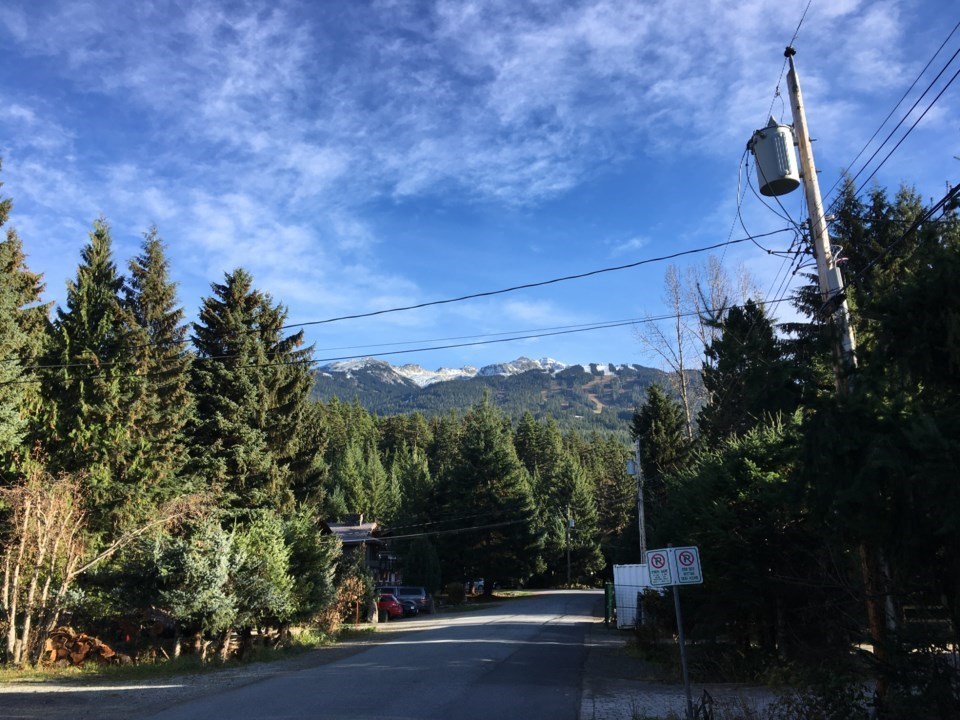Opponents of a costly project to bury power lines in White Gold came out in force to Whistler’s April 26 council meeting to voice their opposition to a resident-initiated process that could cost them tens of thousands of dollars once all is said and done.
“As a young person who has grown up in this community, I find it a shame to see so many of my friends leaving for Pemberton, Squamish or the Island because it’s not fiscally feasible to live in this town,” said resident and Olympic gold medal ski-cross racer Marielle Thompson at the meeting, comments that drew applause from the assembled audience. “Our community of White Gold has a wide mix of residents, many of whom are retired and have fixed incomes and who won’t be able to pay their taxes if they keep getting hit with these astronomical tax bills every year.”
All told, nine people spoke against the project at the April 26 meeting.
On Sept. 5, 2019, council received a letter expressing the interest of White Gold residents to initiate a formal petition process for the work, which would involve the burial of roughly two kilometres of overhead utility lines, to be replaced with underground infrastructure.
As of December 2020, the total estimated cost for homeowners was pegged at $4,675,000, which could be covered by each affected resident with a lump sum payment of $38,751, or 30 annual parcel tax payments of between $1,130 and $1,230, depending on the property and the complexity of the work required.
The project required a majority, and of 160 affected homeowners, 93 voted in favour, or 58 per cent.
That original estimate has since ballooned by nearly $3 million, for a total projected cost to homeowners of $7,488,118, representing a lump sum payment of $46,801 per resident, or 30 annual parcel tax payments of $2,438.
With some cost estimates still remaining, the cost could fall below its original price tag, in which case the process would move forward, with the Resort Municipality of Whistler (RMOW) awarding contracts for the work and signing agreements with service providers. (The RMOW can technically choose not to award a contract for the work even if the cost meets or subceeds the initial estimate, “but there is a mandate from the neighbourhood to go ahead,” said Mayor Jack Crompton.)
If it stays above the initial cost estimate, however, the project will go back to petition, giving residents another chance to have their say. Council can also decide not to proceed.
Council is required to pass a Loan Authorization Bylaw in order to access funds from the Municipal Finance Authority, which gives them the chance to approve or opt not to approve the Bylaw.
Another option raised by a resident at the April 26 meeting was increasing the threshold required to approve the project from a simple majority, as dictated by B.C.’s Community Charter, which council can pursue if it goes back to petition. There was some worry, however, about what precedent that might set for future Local Area Service petitions.
“If we set this threshold that we start to move forward with, it becomes increasingly unlikely that anyone will ever access this provincial tool moving forward,” said Crompton. “It’s just if council starts to go down this path, what does that mean when you consider bringing forward a petition on something that you care about?”
That said, if the RMOW raises the voting threshold for this project, it is not required to use the same standard for future service area petitions, officials confirmed after the meeting.
The municipality is expecting to get the final cost estimates and project design—with specific locations of planned hydro boxes, some of which will be on owners’ properties—in the coming weeks.
For owner Keith Auchinachie, the whole process has left him wondering if he should sell and leave the community altogether.
“I mentioned this to a lot of friends of mine, and somebody said, ‘Well, you’re abandoning Whistler,’ and I said, ‘No, it feels like Whistler is abandoning me,’” he said.
For more information, and to stay up to date on the project, visit whistler.ca/whitegoldutilities.
This story has been updated from the print version that appeared in Pique's April 28th edition after the RMOW provided additional information.




